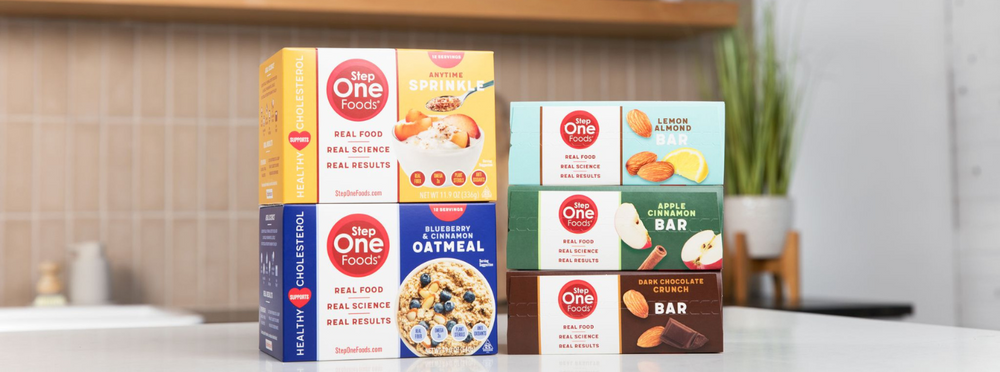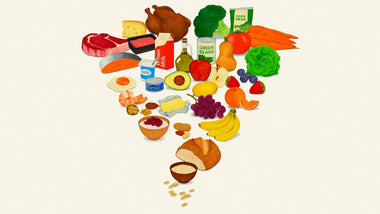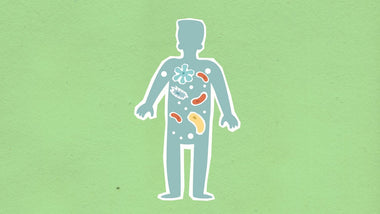Un-Processed, Processed, and Ultra-Processed Foods. What’s the Difference?

When we walk into a grocery store, we encounter foods that are presented to us in various forms. From the pyramid of apples and bags of lettuce in the produce section, to the rotisserie chicken in the warmer, to the boxes of cereal and cans of Pringles lined up on shelves. You might guess that the Pringles are a processed food. But did you know that everything other than the apples qualifies for that category as well?
What does “processed food” really mean?
Almost everything we eat is technically “processed.” Even washing, chopping, or cooking food qualifies as processing. The USDA defines processed foods as any food that has been altered from its natural state. So yes, your homemade tomato soup and your morning oatmeal are “processed” too. As is the rotisserie chicken and bagged salad.
The problem isn’t the fact that a food is processed. It’s how extensively it's processed.
Understanding the processing spectrum
Think of food processing on a spectrum. At one extreme are ultra-processed foods (UPFs): frozen dinners, sugary cereals, chips, and packaged snacks filled with added sweeteners, artificial colors, preservatives, and lab-made emulsifiers. These items typically contain highly refined grains devoid of fiber and a laundry list of additives with little to no nutritional value.
At the opposite end of the spectrum are minimally processed foods, like bagged salads and Step One Foods. These retain the integrity of their whole food ingredients and undergo the least amount of modification necessary to preserve quality, safety, and taste.
The health risks of ultra-processed foods
Recent studies continue to spotlight the dangers of ultra-processed foods. A study published in the American Journal of Preventive Medicine concluded that higher consumption of UPFs is associated with an increased risk of multiple negative health outcomes, including heart disease, type 2 diabetes, and early death. The researchers emphasized that diets high in UPFs are consistently linked to adverse health effects across global populations.
These findings reinforce the need to prioritize whole and minimally processed foods for long-term health.
Step One Foods: minimally processed and clinically proven
At Step One Foods, our approach is unique: every ingredient we use is chosen for its proven ability to support cardiometabolic health and lower cholesterol. We use whole oats and extra oat bran, real fruit, nuts, seeds, and plant sterols — and nothing unnecessary.
We don't rely on preservatives, dyes, binders, or artificial sweeteners. We don’t manipulate our ingredient lists by "splitting" or "combining" ingredients to make them sound healthier than they are. And we don't include ingredients just for texture or shelf life if they don’t serve a nutritional purpose.
Our “processing” consists of mixing or pressing whole food ingredients together—to form a bar or blend an oatmeal. It’s food preparation, not industrial manipulation.
A real ingredient comparison
Let's compare the Step One Foods Apple Cinnamon Bar to the KIND Apple Cinnamon Protein Breakfast Bar:
Step One Foods Apple Cinnamon Bar
Ingredients: Apples, dates, almonds, white chia seeds, walnuts, dried cranberries (cranberries, apple juice concentrate, sunflower oil), raisins, oat bran, plant sterols, cinnamon, Saskatoon berries.
KIND Apple Cinnamon Protein Breakfast Bar
Ingredients: Oats, tapioca syrup, soy protein isolate, canola oil, dried apple, cane sugar, raisin paste, cinnamon, millet, molasses, buckwheat, amaranth, quinoa, natural flavor, sea salt, vitamin E (mixed tocopherols for freshness)
Step One’s bar features whole food ingredients like apples, dates, almonds, walnuts, and chia seeds, with no artificial additives. It’s also formulated with plant sterols, which have been clinically proven to help lower cholesterol.
On the other hand, KIND’s version includes multiple added sugars/sweeteners (tapioca syrup, cane sugar, molasses), processed protein isolates, and natural flavors—ingredients more typical of UPFs.
While both offer convenience and are gluten-free, only Step One’s bar is designed specifically to support cardiometabolic health with a focus on whole-food integrity and minimal processing.
We’re not just “not processed”... we’re purposeful
Whether you call us “minimally processed,” “heart-healthy,” or “food-as-medicine,” we’re proud to exist in a category of our own.
Step One Foods was founded on the belief that nutrition can be a powerful tool in preventing and even reversing chronic conditions like high cholesterol and heart disease. Every product we make is created with purpose, convenience, and science-backed nutrition in mind.
Ready to ditch ultra-processed foods?
If you're looking for a convenient, clinically proven way to lower cholesterol, improve heart and cardiometabolic health, and support overall wellness using real food, Step One Foods is here to help. Our products are designed to fit seamlessly into your busy life, without compromising on quality, integrity, or results.

Tested & Proven Results.
- Cardiologist formulated
- Supported by over 500 publications
- Clinically-proven, in a double-blind randomized trial with Mayo Clinic and The University of Manitoba
80% of participants lowered their cholesterol in just 30 days. With just two servings per day, Step One Foods offers a proven-effective way to naturally lower LDL (bad) cholesterol.
Get heart health tips and articles like this, delivered right to your email.
New articles every week.
You may also like...

The Heart of the Matter: The Engine That Makes Whole-Body Health Possible

The New Food Pyramid: What It Gets Right (and What It Misses)

You don’t need to avoid foods with cholesterol…except for these


